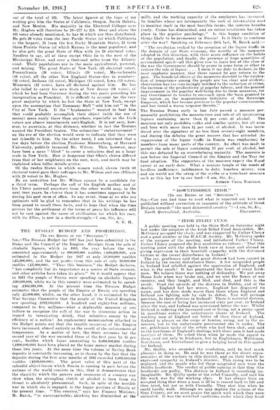THE RUSSIAN BUDGET AND PROHIBITION.
[To THE EDITOR OF THE "SPECTATOR."]
Suss—The Russian Budget for 1917 has just been submitted to the Duma and the Council of the Empire. Receipts from the sale of alcoholic hinters, which in 1913. the year before the war, amounted approximately to 900,000,000 roubles (190,000,000), are estimated in the Budget for 1917 at only 50,000,000 roubles (15,000,000), and the net profits from this sale at only 10,000,000 roubles (11,000,000). "Thus this business," the Budget declares, "has completely lost its importance as a source of State revenue, and other articles have taken its place." So it would appear that in 1913 the people of Russia were spending on alcoholic liquors 190,000,000, while we in this country were estimated to be spending 1166,681,000. At the present time the Russian Budget estimates that the people of the Empire of Russia are spending only 15,000,000, whilst, on the other hand, it is estimated by the War Savings Committee that the people of the United Kingdom are spending 1182,000,000. A hundred and eighty-two millions, compared • to five millions—what a deplorable measure of our failure to recognize the call of the war to strenuous action in regard to intoxicating drink, that relentless enemy to the efficiency of a nation! An explanatory memorandum attached to the Budget points out that the taxable resources of the Empire have increased, almost entirely as the result of the enforcement of temperance. As a matter of fact, the State revenues for the second year of the war exceeded those of the first year by 45 per cent., besides which loans amounting to 8,000,000,000 roubles (1800,000,000) have been placed on the home money market during these two years. At the same time the volume of Saving Bank deposits is constantly increasing, as is shown by the fact that the deposits during the first nine months of 1916 exceeded 1,000,000,000 roubles (1100,000,000). The great value of this pea of the splendid object-lesson which Russia is causing to pass before the nations of the world consists in this, that it demonstrates that the elasticity which the powers and resources of a country can show when the strangling clutch of alcohol is torn from its throat is absolutely phenomenal. Such, in spite of the terrible war in which she is engaged, is the happy position of Russia at the present .time. "The country," says her Finance Minister, M. Bards, "is unrecognizable; shirking has diminished at the mills, and the working capacity of the employees has increased. In families where -not infrequently the reek of intoxication used to manifest itself in the most horrible forms, the iumates breathe freely. Crime has diminished, and an entire revolution has taken place in the popular psychology." Is this happy condition of things likely to be permanent in Russia? Is it likely to continue after the war? Speaking on February :Nth last, M. Barck said :— " The revolution evoked by the cessation of the liquor traffic in the domain of our State economy, the novelty of the measures adopted in this direction, with their acute influence on the habits of the population, and finally, the presence of huge quantities of accumulated spirit—all this gives rise to fears lest at the close of the war the Government should he prone in some form or other to restore the sale of liquor. . . I deem it my duty to declare, in the most emphatic manner, that there cannot be any return to the past. The beneficial effects of the measures directed to the ratification of temperance among the people are too clear and evident; observation has too convincingly testified to the reduction of crime, the increase of the productivity of popular labour, and the general improvement in the popular well-being due to these measures, for any Government to resolve to encroach upon the boon granted to the nation on the magnanimous initiative of the Sovereign Emperor, which has become precious to the popular consciousness, and has found a warm response therein."
The Russian Duma early in last July passed a measure per. manently prohibiting the manufacture and sale of all intoxicating
liquors containing more than 14 per cent. of alcohol. The measure not only prohibits vodka and similar spirits, but. all wine and, beer with more than 14 per cent, of alcohol. It was introduced over the signature of no less than seventy-eight members, and during the debates the great success that has attended he suppression of the liquor traffic in Russia was emphasized by members from many parts of the country. An effort was ma& to permit the sale of liquor containing 13 per cent, of alcohol, but this was defeated by an overwhelming majority. The measure as now before the Imperial Council of the Empire and the Thar for final adoption. The supporters of the measure expect the Royal assent at an early date. What a noxious tangle of the weeds of heedless inefficiency. indifference to duty; hopeless misery, vice and sin would not the sweep of the scythe of a trenchant measure such as this lay low in our land.—I am, Sir, &e.,
ANDREW Casio ROBINSON.












































 Previous page
Previous page